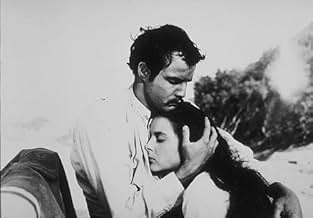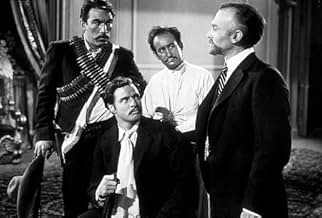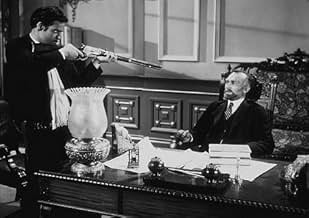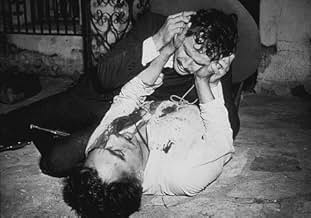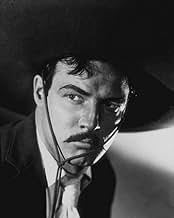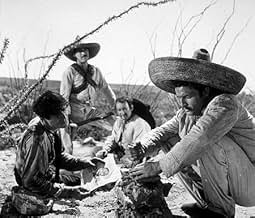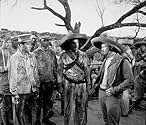The story of Mexican revolutionary Emiliano Zapata, who led a rebellion against the corrupt, oppressive dictatorship of President Porfirio Díaz in the early 20th century.The story of Mexican revolutionary Emiliano Zapata, who led a rebellion against the corrupt, oppressive dictatorship of President Porfirio Díaz in the early 20th century.The story of Mexican revolutionary Emiliano Zapata, who led a rebellion against the corrupt, oppressive dictatorship of President Porfirio Díaz in the early 20th century.
- Won 1 Oscar
- 5 wins & 9 nominations total
Rico Alaniz
- Guard
- (uncredited)
Daniel Armijo
- Undetermined Secondary Role
- (uncredited)
Ross Bagdasarian
- Officer
- (uncredited)
Salvador Baguez
- Soldier
- (uncredited)
- Director
- Writers
- All cast & crew
- Production, box office & more at IMDbPro
Featured reviews
The history of Mexico, our southern neighbor (and sometimes victim) is better known to American movie goers than the history of most countries.
You begin with the Maya (KINGS OF THE SUN), the conquest of Mexico (THE CAPTAIN FROM CASTILE), then to the founding of Father Serra's missions in California (SEVEN CITIES OF GOLD), and then the Spanish in the southwest and California (THE MARK OF ZORRO). Mexican - American history begins with the Texas War for Independence (THE ALAMO, THE LAST TEXAN, etc.). We skip to the French "intervention": JUAREZ and VERA CRUZ. Then we tend to skip the long reign of Porfirio Diaz.
Then comes the Mexican Revolution. The number of films that deal with the revolution is vast. But here are just a few titles: VIVA ZAPATA, VIVA VILLA, VILLA RIDES, THE OLD GRINGO (about Ambrose Bierce's probable death in Mexico's revolution), VIVA MARIA (a spoof but it touches on some issues), THE THREE AMIGOS, THEY CAME TO CORDURA (regarding the American Intervention under General Pershing in 1916), THE FUGITIVE (dealing with the anti-Catholic policies of the 1920s and 1930s), and even THE TREASURE OF SIERRA MADRES (when you see the business with Alfonso Badoya's bandit gang against the Federales).
The Mexican Revolution had many heroes. Many were heroes for one group but devils to another. Madero and Carranza stressed the need to have a nation that was loyal to a written constitution. Zapata would be one of the leaders of the land reform movement. Starting with Francisco Madero, going through Pancho Villa and Eufremio Zapata, going to their enemy Venusiano Carranza, to Obregon, Calles, and the great land reformer Lazaro Cardenas - the leadership was varied. The largest concentration of films is on the colorful (and murderous) Villa (a recent cable television movie was about Villa and his contract with D. W. Griffith to shoot a movie, AND STARRING PANCHO VILLA). But historians usually feel that while Villa tended to be on the side of the peasants, he had too much of the bandit in him to be a leader of the revolution's reforms. Zapata, on the other hand actually tried to reform the division of land. His work never got as far as he wanted before he was assassinated, but it was burned into the souls of the people from his region of Mexico (who still call themselves Zapatistas when involved in political protests to this day), and it did help set the stage for Cardenas' reforms in the late 1930s.
With direction by Elia Kazan and screenplay by John Steinbeck, VIVA ZAPATA is a wonderful, if simplistic view of the Revolution for American audiences. Brando underplays the lead for the most part - Zapata was not an explosive personality like Villa. Anthony Quinn is the explosive brother, whose more selfish attitudes leads to his own disaster. Of the supporting players, Alan Reed is good in his scene as Villa, where he discusses the future of Mexico with Zapata. Joseph Wiseman is properly sinister as an constant malcontent agent provocateur, insinuating each leader is too weak or unreliable to lead.
There are great set pieces - like Kazan's symbolic assassination of Madero by General Huerta's goons who drown out the little reformer/orator's voice as he tries to scream with a siren (but it makes the screams of the unheard martyr like a clarion call to Mexico).
Is it real Mexican history? Not quite - it is a version of it. But it is a really well done version of it.
You begin with the Maya (KINGS OF THE SUN), the conquest of Mexico (THE CAPTAIN FROM CASTILE), then to the founding of Father Serra's missions in California (SEVEN CITIES OF GOLD), and then the Spanish in the southwest and California (THE MARK OF ZORRO). Mexican - American history begins with the Texas War for Independence (THE ALAMO, THE LAST TEXAN, etc.). We skip to the French "intervention": JUAREZ and VERA CRUZ. Then we tend to skip the long reign of Porfirio Diaz.
Then comes the Mexican Revolution. The number of films that deal with the revolution is vast. But here are just a few titles: VIVA ZAPATA, VIVA VILLA, VILLA RIDES, THE OLD GRINGO (about Ambrose Bierce's probable death in Mexico's revolution), VIVA MARIA (a spoof but it touches on some issues), THE THREE AMIGOS, THEY CAME TO CORDURA (regarding the American Intervention under General Pershing in 1916), THE FUGITIVE (dealing with the anti-Catholic policies of the 1920s and 1930s), and even THE TREASURE OF SIERRA MADRES (when you see the business with Alfonso Badoya's bandit gang against the Federales).
The Mexican Revolution had many heroes. Many were heroes for one group but devils to another. Madero and Carranza stressed the need to have a nation that was loyal to a written constitution. Zapata would be one of the leaders of the land reform movement. Starting with Francisco Madero, going through Pancho Villa and Eufremio Zapata, going to their enemy Venusiano Carranza, to Obregon, Calles, and the great land reformer Lazaro Cardenas - the leadership was varied. The largest concentration of films is on the colorful (and murderous) Villa (a recent cable television movie was about Villa and his contract with D. W. Griffith to shoot a movie, AND STARRING PANCHO VILLA). But historians usually feel that while Villa tended to be on the side of the peasants, he had too much of the bandit in him to be a leader of the revolution's reforms. Zapata, on the other hand actually tried to reform the division of land. His work never got as far as he wanted before he was assassinated, but it was burned into the souls of the people from his region of Mexico (who still call themselves Zapatistas when involved in political protests to this day), and it did help set the stage for Cardenas' reforms in the late 1930s.
With direction by Elia Kazan and screenplay by John Steinbeck, VIVA ZAPATA is a wonderful, if simplistic view of the Revolution for American audiences. Brando underplays the lead for the most part - Zapata was not an explosive personality like Villa. Anthony Quinn is the explosive brother, whose more selfish attitudes leads to his own disaster. Of the supporting players, Alan Reed is good in his scene as Villa, where he discusses the future of Mexico with Zapata. Joseph Wiseman is properly sinister as an constant malcontent agent provocateur, insinuating each leader is too weak or unreliable to lead.
There are great set pieces - like Kazan's symbolic assassination of Madero by General Huerta's goons who drown out the little reformer/orator's voice as he tries to scream with a siren (but it makes the screams of the unheard martyr like a clarion call to Mexico).
Is it real Mexican history? Not quite - it is a version of it. But it is a really well done version of it.
Emiliano Zapata (Marlon Brando) was a principled, charismatic revolutionary who led peasants from Mexico in the early part of the 20th century against the dictator, Porfirio Diaz who might had proclaimed himself the father of the nation but was stealing land from the poor farmers.
What Viva Zapata shows that the cycle of betrayal is endless, one dictator goes and another one emerges. When Zapata is President his brother Eufemio (Anthony Quinn) regards it is his right to take land and property by force.
With at times a literate and clever script written by John Steinbeck, direction by the then leftist Elia Kazan the film is too uneven. There are at times some great black and white photography but the film lacks action, the plot is messy and it does not always makes sense.
Brando gives a sombre and moody performance but does look odd as a Mexican. A more natural rough-hewn performance is given by Quinn.
What Viva Zapata shows that the cycle of betrayal is endless, one dictator goes and another one emerges. When Zapata is President his brother Eufemio (Anthony Quinn) regards it is his right to take land and property by force.
With at times a literate and clever script written by John Steinbeck, direction by the then leftist Elia Kazan the film is too uneven. There are at times some great black and white photography but the film lacks action, the plot is messy and it does not always makes sense.
Brando gives a sombre and moody performance but does look odd as a Mexican. A more natural rough-hewn performance is given by Quinn.
Although in fact Emiliano Zapata never became president of Mexico, for the most part this is a pretty good account of the illiterate peasant who became a romantic revolutionary. For this portrayal in his third film Marlon Brando got a second Academy Award nomination for Best Actor, but lost to Gary Cooper for High Noon.
And as a film concerning the turmoil in Mexico during the teen and twenty years of the last century Viva Zapata! is far better than MGM's Viva Villa that starred Wallace Beery. Then again Marlon Brando is a much better actor.
One critical thing that was left out of the story is how much land the Roman Catholic Church held in Mexico. It was not just the rich Estancias that kept the masses in Mexico in peonage, the Church had a really big share of the real estate there. If the story were written today the Church's involvement would be shown. My guess is in the years of the Cold War and the height of Joe McCarthy, no one in Hollywood wanted to make a film that criticized the church in any way. But even a few years earlier the overreaction against the church was done in the John Ford film, The Fugitive which takes place within 10 to 20 years after Zapata died.
Zapata as played by Brando may be illiterate, but he is possessed of a simple eloquence and a charisma that made him a revolutionary figure, in the same manner Che Guevara became forty years later. He tries hard to hold to the ideals of the revolution, but finds as most do that tearing down a government is relatively easy, building one from scratch is a task that has defeated many.
Anthony Quinn plays Emiliano's swaggering brother Eufemio who's not quite as idealistic as Brando. Quinn received first Academy Award for Best Supporting Actor for the part. Quinn fills the screen with his bluster when he's on, it provides a perfect counterpoint to Brando's more idealistic role.
The guy who never gets praise for his performance is Joseph Wiseman. Wiseman, a product of the Actor's Studio in New York like Marlon Brando. This is a man whose type I've come across in numerous endeavors in my life, a professional stirrer of resentments. He's not happy unless there's some kind of battle going on. A type mind you that is ultimately dangerous for any movement. He intrigues for the sake of intrigue, but never accomplishes anything. It's a very good job by Wiseman, not often talked about for some reason.
Besides Quinn's Oscar and Brando's nomination, Viva Zapata! got Oscar nominations for Best Art&Set Direction for black and white film, Best music, and Best Screenplay. The last would have been a great honor for John Steinbeck, I'm not sure how many if any writers won a Pulitzer Prize, a Nobel Prize and an Oscar. That's three horse parlay that can't be beat.
For some reason Elia Kazan was overlooked for Best Director, possibly because he had won the year before for A Streetcar Named Desire.
Still Viva Zapata! is a work that stands up very well even with the historical inaccuracies.
And as a film concerning the turmoil in Mexico during the teen and twenty years of the last century Viva Zapata! is far better than MGM's Viva Villa that starred Wallace Beery. Then again Marlon Brando is a much better actor.
One critical thing that was left out of the story is how much land the Roman Catholic Church held in Mexico. It was not just the rich Estancias that kept the masses in Mexico in peonage, the Church had a really big share of the real estate there. If the story were written today the Church's involvement would be shown. My guess is in the years of the Cold War and the height of Joe McCarthy, no one in Hollywood wanted to make a film that criticized the church in any way. But even a few years earlier the overreaction against the church was done in the John Ford film, The Fugitive which takes place within 10 to 20 years after Zapata died.
Zapata as played by Brando may be illiterate, but he is possessed of a simple eloquence and a charisma that made him a revolutionary figure, in the same manner Che Guevara became forty years later. He tries hard to hold to the ideals of the revolution, but finds as most do that tearing down a government is relatively easy, building one from scratch is a task that has defeated many.
Anthony Quinn plays Emiliano's swaggering brother Eufemio who's not quite as idealistic as Brando. Quinn received first Academy Award for Best Supporting Actor for the part. Quinn fills the screen with his bluster when he's on, it provides a perfect counterpoint to Brando's more idealistic role.
The guy who never gets praise for his performance is Joseph Wiseman. Wiseman, a product of the Actor's Studio in New York like Marlon Brando. This is a man whose type I've come across in numerous endeavors in my life, a professional stirrer of resentments. He's not happy unless there's some kind of battle going on. A type mind you that is ultimately dangerous for any movement. He intrigues for the sake of intrigue, but never accomplishes anything. It's a very good job by Wiseman, not often talked about for some reason.
Besides Quinn's Oscar and Brando's nomination, Viva Zapata! got Oscar nominations for Best Art&Set Direction for black and white film, Best music, and Best Screenplay. The last would have been a great honor for John Steinbeck, I'm not sure how many if any writers won a Pulitzer Prize, a Nobel Prize and an Oscar. That's three horse parlay that can't be beat.
For some reason Elia Kazan was overlooked for Best Director, possibly because he had won the year before for A Streetcar Named Desire.
Still Viva Zapata! is a work that stands up very well even with the historical inaccuracies.
When I read so many of the comments on this film featured here, I find it difficult to understand how so many viewers fail to appreciate the incredible nature of the collaboration that produced it. The very idea of a motion picture scripted by John Steinbeck, directed by Elia Kazan, scored by Alex North, starring Marlon Brando, co-starring Anthony Quinn........this is an almost unbelievable gathering of artistic giants.
Taste in movies varies and thus one can be certain that some will not respond positively even to this one. After over five decades of movie-going, I can look back and remember precious few pictures that rise to the high level of excellence to be found in "Zapata". With its spellbinding storytelling, superb cast in top form, its insightful examination of issues which are still crucially relevant today, I can not fathom why some would not praise it.
Like a long list of really fine titles that endlessly persist in remaining unavailable in DVD release, this film has me wondering once again why, in the vastness of the internet, one can not discover the reason why this major Brando star-vehicle continues to be withheld from circulation. Is such information so impossible to find that no one can unearth it?
You can tell from reading the viewer comments that not everyone will agree on this, but I would suggest that anyone who appreciates literate, superbly crafted classic motion pictures should make every effort to see this one. I wish I could invite you all to a great gala screening of it. I know you would be dazzled by its splendor.
Taste in movies varies and thus one can be certain that some will not respond positively even to this one. After over five decades of movie-going, I can look back and remember precious few pictures that rise to the high level of excellence to be found in "Zapata". With its spellbinding storytelling, superb cast in top form, its insightful examination of issues which are still crucially relevant today, I can not fathom why some would not praise it.
Like a long list of really fine titles that endlessly persist in remaining unavailable in DVD release, this film has me wondering once again why, in the vastness of the internet, one can not discover the reason why this major Brando star-vehicle continues to be withheld from circulation. Is such information so impossible to find that no one can unearth it?
You can tell from reading the viewer comments that not everyone will agree on this, but I would suggest that anyone who appreciates literate, superbly crafted classic motion pictures should make every effort to see this one. I wish I could invite you all to a great gala screening of it. I know you would be dazzled by its splendor.
The picture chronicles the Zapata life from his humble upbringing , he played a leading role in the Mexican 1910-1920 revolution until his death . A peasant delegation from Morelos state go to visit Mexican President Porfirio Diaz when Zapata (Marlon Brando) reclaims their rights .Then Zapata along with his brother Eufemio (Anthony Quinn) back to Francisco Madero (Harold Gordon) , though resident in Texas , against Porfirio Diaz . Pancho Villa (Alan Reed) in the northern Mexico and Zapata in the southern fight against Porfirio's Army winning many victories in the field . For a long time Zapata , who seemed in line for leadership of Mexico , enjoyed the sympathetic interest of the United States . Finally, Madero rises to power but General Huertas (Frank Silvera)conspires against him . Huertas rules over , and murders President Francisco Madero . Then Zapata again takes arms against Huertas and he along with Pancho Villa getting the victory in Mexico city and an eventual Presidency but he finishes leaving as a disillusioned politician . But his main enemies , the President Carranza and Obregon will fight for the power against the Villa's revolutionaries .The movie portrays until his early death , but he was assassinated when gunmen ambushed him , like it is well developed in the spectacular final shots , and it is subsequently copied at ¨Butch Cassidy and Sundance Kid¨ (by George Roy Hill with Newman and Redford).
The movie is an exciting retelling of Zapata's Mexican campaign , suffering and love , with broadened focus on the power abuse .The film gets influence from classic Westerns until famous Russian directors (Eisenstein , Pudovkin). Marlon Brando chewing up scenery in the title role in one of his best performances as the hot-tempered , simple-minded revolutionary.
Anthony Quinn won a deserved Oscar for his well portrayed secondary role as rough brother named Eufemio . Besides , powerful and insightful characterization by remainder supporting cast . Based on John Steinbeck's screenplay , plays with the facts , but overall , the movie is entertaining and interesting . Sensitive and evocative music by the two composer masters : Alfred Newman and Alex North . The motion picture was magnificently directed by Elia Kazan . It's a masterpiece and unforgettable classic movie for the cinema lovers .
The movie is an exciting retelling of Zapata's Mexican campaign , suffering and love , with broadened focus on the power abuse .The film gets influence from classic Westerns until famous Russian directors (Eisenstein , Pudovkin). Marlon Brando chewing up scenery in the title role in one of his best performances as the hot-tempered , simple-minded revolutionary.
Anthony Quinn won a deserved Oscar for his well portrayed secondary role as rough brother named Eufemio . Besides , powerful and insightful characterization by remainder supporting cast . Based on John Steinbeck's screenplay , plays with the facts , but overall , the movie is entertaining and interesting . Sensitive and evocative music by the two composer masters : Alfred Newman and Alex North . The motion picture was magnificently directed by Elia Kazan . It's a masterpiece and unforgettable classic movie for the cinema lovers .
Did you know
- TriviaAnthony Quinn was very disappointed when Marlon Brando was cast as Emiliano Zapata - he thought that with his Latin appearance, he would have been a better choice. To solve the argument, both actors competed to see which of them could urinate furthest into the Rio Grande. Quinn lost the bet, but he won an Oscar for the best supporting actor as Zapata's brother.
- GoofsThe real Zapata never had a hands-on role in executions. While he would order the executions of close aides, he was never present as he could not bear to watch.
- Quotes
President Porfirio Diaz: These matters take time. You must be patient.
Emiliano Zapata: With your permission, my President, we make our tortillas with corn, not patience.
- Crazy creditsActress Mildred Dunnock is credited in opening credits but not in closing credits.
- ConnectionsFeatured in Cinefile: Marlon Brando, Wild One (1994)
Details
- Release date
- Countries of origin
- Languages
- Also known as
- Viva Zapata!
- Filming locations
- Production companies
- See more company credits at IMDbPro
Box office
- Budget
- $1,800,000 (estimated)
- Runtime
- 1h 53m(113 min)
- Color
- Aspect ratio
- 1.37 : 1
Contribute to this page
Suggest an edit or add missing content


